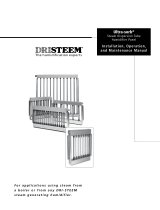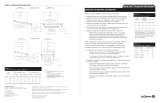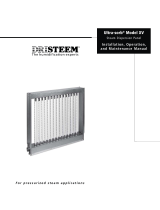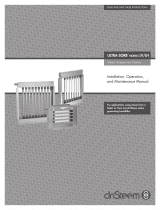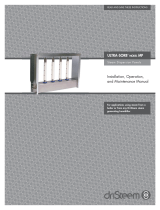Page is loading ...

Humidi-tech
®
Electric Humidifier
Installation, Operation,
and Maintenance Manual

1BHFJJt%3*45&&.)VNJEJUFDI&MFDUSJD)VNJEJGJFS*OTUBMMBUJPO0QFSBUJPOBOE.BJOUFOBODF.BOVBM
WARNING
CAUTION
Indicates a hazardous situation that could result in death or
serious injury if instructions are not followed.
Indicates a hazardous situation that could result in damage to
or destruction of property if instructions are not followed.
WARNING
Attention installer
Read this manual before installing, and leave this manual with product owner. This product must be installed by
qualified HVAC and electrical contractors and in compliance with local, state, federal, and governing codes. Improper
installation can cause property damage, severe personal injury, or death as a result of electric shock, burns, or fire.
DRI-STEEM Technical Support: 800-328-4447
Read all warnings and instructions
Read this manual before performing service or maintenance procedures on any part of the system. Failure to follow all
warnings and instructions could produce the hazardous situations described, resulting in property damage, personal
injury, or death.
Failure to follow the instructions in this manual can cause moisture to accumulate, which can cause bacteria and mold
growth or dripping water into building spaces. Dripping water can cause property damage; bacteria and mold growth
can cause illness.
Hot surfaces and hot water
This steam humidification system has extremely hot surfaces. Water in tanks, steam pipes, and dispersion assemblies
can be as hot as 212 °F (100 °C). Discharged steam is not visible. Contact with hot surfaces, discharged hot water, or
air into which steam has been discharged can cause severe personal injury. To avoid severe burns, follow the cool-
down procedure in this manual before performing service or maintenance procedures on any part of the system.
8BSOJOHTBOEDBVUJPOT

%3*45&&.)VNJEJUFDI&MFDUSJD)VNJEJGJFS*OTUBMMBUJPO0QFSBUJPOBOE.BJOUFOBODF.BOVBMt1BHFJJJ
8BSOJOHTBOEDBVUJPOT
WARNING
Disconnect electrical power
Disconnect electrical power before installing supply wiring or performing service or maintenance procedures on any
part of the humidification system. Failure to disconnect electrical power could result in fire, electrical shock, and other
hazardous conditions. These hazardous conditions could cause property damage, personal injury, or death.
Contact with energized circuits can cause property damage, severe personal injury, or death as a result of electrical
shock or fire. Do not remove humidifier electrical panel cover, heater terminal cover, or subpanel access panels until
electrical power is disconnected.
Follow the shutdown procedure in this manual before performing service or maintenance procedures on any part of
the system.
Electric shock hazard
If the humidifier starts up responding to a call for humidity during maintenance, severe bodily injury or death from
electric shock could occur. To prevent such start-up, follow the procedure below before performing service or
maintenance procedures on this humidifier (after the tank has cooled down and drained):
1. Use Vapor-logic
®
4 keypad/display to change control mode to Standby.
2. Shut off all electrical power to humidifier using field-installed fused disconnect, and lock all power disconnect
switches in OFF position.
3. Close field-installed manual water supply shut-off valve.
CAUTION
Hot discharge water
Discharge water can be as hot as 212 °F (100 °C) and can damage the drain plumbing.
To prevent such damage from humidifiers without water tempering, allow the tank to cool before draining.
Humidifiers equipped with a water tempering device such as a DRI-STEEM Drane-kooler need fresh make-up water in order
to function properly. Make sure the water supply to the water tempering device remains open during draining.
Excessive supply water pressure
Supply water pressure greater than 80 psi (550 kPa) can cause the humidifier to overflow.

1BHFJWt%3*45&&.)VNJEJUFDI&MFDUSJD)VNJEJGJFS*OTUBMMBUJPO0QFSBUJPOBOE.BJOUFOBODF.BOVBM
Warnings and cautions................................. ii
Overview
Product overview
Tap/softened water
...................................2
DI/RO water option
.................................. 2
Water type conversion
................................2
Dispersion options
...................................3
Capacities, electrical specifications, and weights
..............4
Dimensions
..............................................5
Installation
Selecting a location
Humidifier
.......................................... 6
Dispersion control devices
............................6
Mounting the humidifier
..................................7
Piping:
Tap/softened water
.....................................8
DI/RO water option
....................................9
Supply water and drain piping
..........................10
Drane-kooler
.........................................11
Wiring
.................................................12
Humidistat and transmitter placement
.....................14
Dispersion:
Selecting the dispersion assembly location
................15
High-efficiency Tube option
............................15
Interconnecting piping requirements
Connecting to humidifier with vapor hose
.............16
Connecting to humidifier with tubing or pipe
..........17
Drip tee installation
...................................18
SDU-I and SDU-E
Mounting SDU-I and SDU-E
......................... 19
SDU-I: Instant, internal absorption
....................19
SDU-E: Higher capacity
.............................19
SDU-E condensate drain connection
..................22
Mounting SDU-E
...................................22
SDU-E rise, spread, and throw
........................ 23
Single tube
...........................................24
Rapid-sorb
Pitch requirements
..................................27
Header outside of duct, horizontal airflow
. . . . . . . . . . . . . . 28
Header inside of duct, horizontal airflow
............... 30
Steam supply connections to Rapid-sorb header
........32
Condensate drain connections to Rapid-sorb header
....32
Ultra-sorb
............................................ 32
5BCMFPGDPOUFOUT
ATTENTION INSTALLER
Read this manual before installing.
Leave manual with product owner.
Where to find more information
Our web site:
The following documents are available on
our web site: www.dristeem.com
t $BUBMPHT
– Humidi-tech
– Ultra-sorb
®
t *OTUBMMBUJPO0QFSBUJPOBOE.BJOUFOBODF
manuals (IOM)
– Ultra-sorb
– Vapor-logic4 controller (includes
humidifier operation and troubleshooting)
t
DRI-STEEM Humidification System Design
Guide
(includes steam loss tables and
general humidification information)

%3*45&&.)VNJEJUFDI&MFDUSJD)VNJEJGJFS*OTUBMMBUJPO0QFSBUJPOBOE.BJOUFOBODF.BOVBMt1BHF
5BCMFPGDPOUFOUT
Keypad/display and troubleshooting
The
Vapor-logic4 Installation and Operation
Manual,
which was shipped with your
humidifier, is a comprehensive operation
manual. Refer to it for information about
using the keypad/display and Web interface,
and for troubleshooting information.
Download DRI-STEEM literature
Most DRI-STEEM product manuals can be
downloaded, printed, and ordered from our
web site: www.dristeem.com
Operation
Start-up procedure
......................................33
Start-up checklist
........................................34
Maintenance
Tap/softened water
Water quality and maintenance
.......................35
Skim duration
......................................35
Cool down humidifier
...............................36
Inspection and maintenance
..........................36
Off-season shut-down procedure
.....................39
DI/RO water option
Cool down humidifier
...............................40
Inspection and maintenance
..........................40
Off-season shut-down procedure
.....................41
Replacement parts
Humidifier .............................................42
SDU-E
.................................................44
SDU-I
.................................................45
Subpanel
...............................................46
Warranty
................................... Back cover

1BHFt%3*45&&.)VNJEJUFDI&MFDUSJD)VNJEJGJFS*OTUBMMBUJPO0QFSBUJPOBOE.BJOUFOBODF.BOVBM
Bracket under evaporating chamber
allows easy removal for cleaning
Removable
evaporating
chamber
Water fill
access hole
Incoloy alloy-sheathed
immersion heaters
Keyholes
for wall
mounting
Water fill
Electrical area
Skimmer port
and overflow
drain
Electrical conduit knockouts
Flexible vapor hose,
pipe, or tubing
connects to dispersion
tube(s) or to an SDU
Duct
Single
dispersion
tube with
condensate
return line
Figure 2-3:
Installation overview
(Humidi-tech for tap/softened water shown)
1SPEVDUPWFSWJFX
OM-82-4
Notes:
See Pages 8 and 9 for detailed installation
drawings.
Damage caused by chloride corrosion is not
covered by your DRI-STEEM warranty.
Overview
Figure 2-2:
Water level control for DI/RO water
option humidifier
Supply water connection
Float rod
Float ball
OM-7396
Humidifiers using tap or softened water
control water levels electronically using a
three-rod probe. The controller responds
with the above actions when the water level
reaches each rod.
Figure 2-1:
Water level control for tap/softened
water humidifier
VLC-OM-030
Fill valve opens when water
level is below this probe.
Low-water cutoff. Power to
heaters is cut if water level
drops below this probe.
Fill valve closes when water
level rises to this probe.
Humidifiers using DI/RO water control water
levels using a float valve and low-water
cutoff switch.
Tap/softened water
Humidi-tech humidifiers with tap/softened water (shown above)
use electricity to heat tap or softened fill water into steam for
humidification. A conductivity probe monitors the water level;
therefore, water conductivity must be at least 30 μS/cm for proper
operation. Humidi-tech with tap/softened water will not operate
with DI/RO water. For DI/RO water, use Humidi-tech with the
DI/RO water option.
DI/RO water option
Humidi-tech humidifiers with DI/RO water systems (systems using
deionized water or water that has been treated using reverse osmosis)
use electricity to heat DI/RO fill water into steam for humidification.
Water level is controlled with a float valve and low water cutoff
switch. Float valves are compatible with DI/RO water only.
Humidifiers with the DI/RO water option are virtually maintenance
free and require little or no downtime.
Water type conversion
Humidi-tech tap/softened water humidifiers can be converted in
the field for use with DI/RO water, and Humidi-tech DI/RO water
humidifiers can be converted in the field for use with tap/softened
water. Contact your DRI-STEEM representative or distributor for
parts and instructions.

%3*45&&.)VNJEJUFDI&MFDUSJD)VNJEJGJFS*OTUBMMBUJPO0QFSBUJPOBOE.BJOUFOBODF.BOVBMt1BHF
1SPEVDUPWFSWJFX
Dispersion options
In addition to single tube dispersion, shown in Figure 2-3,
the dispersion options shown on this page are available for
Humidi-tech humidifiers. See the installation instructions
beginning on Page 19.
Overview
Figure 3-3:
SDU mounting options
OM-56-1
Remote from humidifier
Directly above humidifier
OM-55-1
Air
intake
vents
Steam
outlet
Figure 3-1:
Ultra-sorb dispersion
OM-636-1
Figure 3-2:
Rapid-sorb dispersion
OM-637-1

1BHFt%3*45&&.)VNJEJUFDI&MFDUSJD)VNJEJGJFS*OTUBMMBUJPO0QFSBUJPOBOE.BJOUFOBODF.BOVBM
$BQBDJUJFTFMFDUSJDBMTQFDJGJDBUJPOT
BOEXFJHIUT
Overview
Figure 4-1:
Steam outlet connections
DC-1168
Hose clamp (for vapor hose)
Table 4-2:
Steam connection sizes
HT model Steam outlet
2, 4, 6, 8
1 ½" hose or
BSP connection
10*, 12*, 14*, 16*
1 ½" or 2" hose or
BSP connection
21, 25, 30, 34
2" hose or
BSP connection
* If using with an SDU-E (Space Dispersion Unit
External Absorption), the Humidi-tech steam outlet
must be 2" to match the SDU-E steam inlet.
The steam outlet is designed to connect to a
vapor hose or BSP connection.
Tap/softened water Humidi-tech shown.
Table 4-1:
Humidi-tech electrical specifications, capacities and weights
HT model Single-phase 230V Three-phase 400V
Shipping
weight (kg)
Operating
weight (kg)
kW Steam capacity (kg/h)
I max. (A) Steam capacity (kg/h) I max. (A)
2 2.5 8.0 — — 37 44
4 5.0 16.0 5.4 8.7* 37 44
6 7.5 24.0 8.2 13.0* 41 56
8 10.0 31.9 10.9 17.3* 41 56
10 12.5 39.9 13.6 15.2* 43 64
12 15.0 47.9 16.3 17.3 43 64
14 — — 19.1 20.2 43 64
16 — — 21.8 23.1** 43 64
21 — — 28.6 30.3** 44 70
25 — — 34.0 36.1** 44 70
30 — — 40.8 43.3** 47 72
34 — — 46.3 49.1** 47 72
*
For wire sizing, the highest leg draw is shown due to current imbalance.
** No available SDU option for these models.
Notes:
t4%6*JTBWBJMBCMFGPS.PEFMT)5UISPVHI)5
t4%6&JTBWBJMBCMFGPSBMMNPEFMTFYDFQU.PEFM)5BOE.PEFMT)5UISPVHI)5
t.PEFMTXJUIUIF4%6PQUJPOIBWFBEEJUJPOBMFMFDUSPOJDDPNQPOFOUTJOUIF)VNJEJUFDIDBCJOFU*GBEEJOHBO4%6BEEUIFGPMMPXJOHUPUIF)VNJEJUFDITIJQQJOH
and operating weights:
SDU-E: 5.5 kg
SDU-I: 4.0 kg
t"MM)VNJEJUFDIIVNJEJmFSTPQFSBUFBU)[
t4%6TTIJQTFQBSBUFGSPNUIF)VNJEJUFDI

%3*45&&.)VNJEJUFDI&MFDUSJD)VNJEJGJFS*OTUBMMBUJPO0QFSBUJPOBOE.BJOUFOBODF.BOVBMt1BHF
Overview
%JNFOTJPOT
Figure 5-1:
Humidi-tech dimensions
DC-1167
50 mm
Venting
13 mm hole in base for water fill line
Steam outlet
Top view
614 mm
Left side view Front view
Bottom view
57 mm
409 mm
472 mm
57 mm
614 mm
19 mm
276 mm
50 mm
25 mm
57 mm
38 mm
146 mm
DN20 pipe thread frame drain
DN20 pipe thread tank drain
16 mm
38 mm
146 mm
Control or SDU wiring knockout
Power wiring knockout
Control or SDU wiring knockout
Power wiring knockout

1BHFt%3*45&&.)VNJEJUFDI&MFDUSJD)VNJEJGJFS*OTUBMMBUJPO0QFSBUJPOBOE.BJOUFOBODF.BOVBM
4FMFDUJOHBMPDBUJPO
Humidifier
When selecting a location for the humidifier, consider the
following:
t Proximity to the duct
Install the humidifier near the air duct system where
the dispersion assembly will be located. The maximum
recommended length for steam hose connecting a single
humidifier to a dispersion assembly is 3 m. The maximum
recommended developed length for tubing or pipe connecting a
single humidifier to a dispersion assembly is 6 m.
For more information about installing dispersion assemblies, see
“Dispersion,” beginning on Page 15.
t &MFWBUJPOPGUIFJOTUBMMFEEJTQFSTJPOBTTFNCMZ
The recommended installation location for the dispersion
assembly is at an elevation higher than the humidifier. However,
if the dispersion assembly must be installed at an elevation lower
than the humidifier, install a drip tee and drain. See “Drip tee
installation” on Page 18.
Before installing a dispersion assembly or interconnecting
piping, review all pitch requirements in the “Dispersion” section
of this manual.
t 3FRVJSFEDMFBSBODFT (see Figure 7-1)
t
&MFDUSJDBMDPOOFDUJPOT
Electrical power supply connections are at the lower or upper
right rear corner of the unit. See “Wiring” on Pages 12 and 13.
t 4VQQMZXBUFSBOEESBJOQJQJOHDPOOFDUJPOT
Water supply piping and drain connections are at the lower
left rear corner of the unit. See the piping illustrations and
instructions starting on Page 8.
t &YUFSJPSXBMMJOTVMBUJPO
Install the humidifier on an exterior wall only if the wall is
properly insulated.
Dispersion control devices
See Figure 14-1 for recommended installation locations for the
dispersion assembly and associated control devices.
Installation

%3*45&&.)VNJEJUFDI&MFDUSJD)VNJEJGJFS*OTUBMMBUJPO0QFSBUJPOBOE.BJOUFOBODF.BOVBMt1BHF
Follow the instructions below for your wall type, and mount the
humidifier level and plumb. See Figures 8-1 and 9-1.
t 8PPETUVETNNPODFOUFS
.BSLIPMFMPDBUJPOTBUUIFDFOUFSTPGUIFTUVETBOEQSFESJMM
(6 mm) diameter pilot holes. Secure the cabinet to the wall with
the lag bolts (provided).
t .FUBMTUVETNNPODFOUFS
.BSLIPMFMPDBUJPOTBUDFOUFSTPGTUVETBOEESJMMNN
IPMFTUISPVHIUIFTUVETBOEXBMM1VTIBNNCPMU
through the wall, the studs, and a backing plate on the other side
of the wall. Secure the cabinet to the wall with a nut and washer.
t *GNNPODFOUFSTUVETBSFOPUBWBJMBCMF
Mount spanner boards on the wall, spanning two studs. Locate
one board at the top of the cabinet (for the lag bolts) and the
PUIFSCPBSENNPODFOUFSGSPNUIFCPUUPNPGUIF
cabinet. Secure the cabinet to the spanner boards.
t )PMMPXCMPDLPSQPVSFEDPODSFUFXBMM
Mark hole locations, and drill appropriate pilot holes for two
NNUPHHMFCPMUTPSUXPNNNBDIJOFCPMU
lead anchors. Secure the cabinet in place with the bolts and
anchors.
.PVOUJOHUIFIVNJEJGJFS
Installation
Figure 7-1:
Humidi-tech clearance recommendations
Top (when SDU is not mounted directly above
the Humidi-tech): 460 mm
Right side electrical
controls: 915 mm
Supporting wall
Front 915 mm
Floor: 610 mm
Left side:
305 mm
Secured to supporting
wall
To dispersion
assembly
DC-1201
Maintain these clearances for service and maintenance.
WARNING
Mounting hazard
Mount humidifier per the instructions
in this manual and to a structurally
stable surface. Improper mounting of
the humidifier can cause it to fall or tip,
resulting in severe personal injury or
death.

1BHFt%3*45&&.)VNJEJUFDI&MFDUSJD)VNJEJGJFS*OTUBMMBUJPO0QFSBUJPOBOE.BJOUFOBODF.BOVBM
Installation
1JQJOH
5BQTPGUFOFEXBUFS
Figure 8-1:
Humidi-tech (tap/softened water) field piping overview
Water supply line:
t %/DPOOFDUJPOTJ[F
t UPL1BSFRVJSFEXBUFSQSFTTVSF
t *GXBUFSQJQJOHUPIVNJEJmFSJT
nonmetallic, the first 1 m of water supply
piping from humidifier should be metallic.
Steam vapor hose (maximum run 3 m). May also use pipe or tubing.
See the
DRI-STEEM Design Guide
for maximum pipe or tubing
lengths.
Unions by installer
Shock arrester
recommended to
reduce water hammer
DN20 pipe thread tank
drain, skimmer, and P-trap
piping, rated for 100 °C.
If piping run is over 3 m,
increase pipe to DN32 after
P-trap.
25 mm air gap
Spill funnel. Plumb
to floor drain.
Open drain required.
See first note below.
DN20 pipe thread frame drain and P-trap
piping, rated for 100 °C
Frame drain
Cover
Install plumb
DC-1136
Notes:
t -PDBUFBJSHBQPOMZJOTQBDFTXJUIBEFRVBUFUFNQFSBUVSFBOEBJSNPWFNFOUUPBCTPSCnBTITUFBNPUIFSXJTFDPOEFOTBUJPONBZGPSNPOOFBSCZTVSGBDFT
Refer to governing codes for drain pipe size and maximum discharge water temperature.
t 0GGTFUIVNJEJmFSGSPNTQJMMGVOOFMPSnPPSESBJOUPQSFWFOUnBTITUFBNGSPNSJTJOHJOUPDBCJOFU
t %BTIFEMJOFTJOEJDBUFQSPWJEFECZJOTUBMMFS
t 8BUFSTVQQMZJOMFUJTNPSFUIBONNBCPWFTLJNPWFSnPXQPSUFMJNJOBUJOHUIFQPTTJCJMJUZPGCBDLnPXPSTJQIPOJOHGSPNUBOL/PBEEJUJPOBMCBDLnPX
prevention is required; however, governing codes prevail.
t *OTUBMMBVOJPOJOXBUFSTVQQMZBOEESBJOMJOFTBTTIPXOUPBMMPXUBOLSFNPWBM
t %BNBHFDBVTFECZDIMPSJEFDPSSPTJPOJTOPUDPWFSFECZZPVS%3*45&&.XBSSBOUZ
50 mm
300 mm
50 mm water seal or loop in supply
line to isolate steam from nonmetallic
supply piping

%3*45&&.)VNJEJUFDI&MFDUSJD)VNJEJGJFS*OTUBMMBUJPO0QFSBUJPOBOE.BJOUFOBODF.BOVBMt1BHF
1JQJOH
%*30XBUFSPQUJPO
Installation
Figure 9-1:
Humidi-tech (DI/RO water option) field piping overview
DC-1139
Unions by installer
Strainer, by installer
DN20 pipe thread tank drain,
and P-trap piping, rated for
100 °C. If piping run is over
3 m increase pipe to DN32
after P-trap.
25 mm air gap
Spill funnel. Plumb
to floor drain
Frame drain
Cover
Install plumb
First 1 m of water supply line
should be stainless steel tubing
with a 50 mm water seal
or loop in the supply line to
isolate steam from nonmetallic
supply piping.
50 mm
300 mm
Notes:
t -PDBUFBJSHBQPOMZJOTQBDFTXJUIBEFRVBUFUFNQFSBUVSFBOEBJSNPWFNFOUUPBCTPSCnBTITUFBNPUIFSXJTFDPOEFOTBUJPONBZGPSNPOOFBSCZTVSGBDFT3FGFS
to governing codes for drain pipe size and maximum discharge water temperature.
t 0GGTFUIVNJEJmFSGSPNTQJMMGVOOFMPSnPPSESBJOUPQSFWFOUnBTITUFBNGSPNSJTJOHJOUPUIFDBCJOFU
t %BTIFEMJOFTJOEJDBUFQSPWJEFECZJOTUBMMFS
t 5IFXBUFSTVQQMZJOMFUJTNPSFUIBONNBCPWFUIFPWFSnPXQPSUFMJNJOBUJOHUIFQPTTJCJMJUZPGCBDLnPXPSTJQIPOJOHGSPNUIFUBOL/PBEEJUJPOBMCBDLnPX
prevention is required; however, governing codes prevail.
t *OTUBMMBVOJPOJOUIFXBUFSTVQQMZBOEESBJOMJOFTBTTIPXOUPBMMPXUBOLSFNPWBM
t %BNBHFDBVTFECZDIMPSJEFDPSSPTJPOJTOPUDPWFSFECZZPVS%3*45&&.XBSSBOUZ
Open drain required.
See first note below.
DN20 pipe thread frame drain and
P-trap piping, rated for 100 °C
Steam vapor hose (maximum run 3 m). May also use pipe or tubing.
See the
DRI-STEEM Design Guide
for maximum pipe or tubing
lengths.
Water supply line:
t
DN8 connection size
t UPL1BSFRVJSFEXBUFSQSFTTVSF

1BHFt%3*45&&.)VNJEJUFDI&MFDUSJD)VNJEJGJFS*OTUBMMBUJPO0QFSBUJPOBOE.BJOUFOBODF.BOVBM
1JQJOH
4VQQMZXBUFSBOEESBJOQJQJOH
Installation
Supply water piping may be of any code-approved material (copper,
steel, or plastic). The fill valve connection size is a DN10 pipe
thread fitting. In cases where water hammer may be a possibility,
consider installing a shock arrestor. Water pressure must be
between 175 kPa and 550 kPa.
If water piping to humidifier is nonmetallic, we recommend that
the first 1 m of water supply piping from the humidifier be metallic
with a 50 mm water seal or loop in the supply line to isolate steam
from nonmetallic supply piping.
Drain piping may be of any code-approved material (copper, steel,
or plastic rated for 100 °C minimum). If drainage by gravity is not
possible, use a reservoir pump rated for 100 °C water.
The final connection size is DN20 copper for the tank and frame
drains. Do not reduce this connection size. Pipe the tank and
frame drains separately, as shown in Figures 8-1 and 9-1, to prevent
backflow of drain water into the humidifier cabinet.
If the equivalent length of pipe from the humidifier drain to the
plumbing system drain is more than 3 m, increase the pipe size to
DN32.
See Figures 8-1 and 9-1 for more piping instructions.
Important: Install unions in the water supply and drain lines as
shown in Figures 8-1 and 9-1 to allow tank removal.
Figure 10-1:
Drane-kooler water tempering device
DRI-STEEM's Drane-kooler,
shown mounted to a
humidifier, tempers discharged
water. For other Drane-kooler
mounting options or for more
information, contact your
DRI-STEEM representative/
distributor, or view the
Drane-kooler product data
sheet in the literature section
at www.dristeem.com
OM-7398
CAUTION
Hot discharge water
Discharge water can be as hot as 212 °F
(100 °C) and can damage the drain
plumbing.
To prevent such damage from humidifiers
without water tempering, allow the tank
to cool before draining.
Humidifiers equipped with a water
tempering device such as a DRI-STEEM
Drane-kooler need fresh make-up water
in order to function properly. Make sure
the water supply to the water tempering
device remains open during draining.
Excessive supply water pressure
Supply water pressure greater than 80
psi (550 kPa) can cause the humidifier to
overflow.

%3*45&&.)VNJEJUFDI&MFDUSJD)VNJEJGJFS*OTUBMMBUJPO0QFSBUJPOBOE.BJOUFOBODF.BOVBMt1BHF
Installation
1JQJOH
%SBOFLPPMFS
Figure 11-1:
Drane-kooler field piping connections
Tank drain
Frame drain
Field piping
Notes:
t %BTIFEMJOFTJOEJDBUFQSPWJEFECZJOTUBMMFS
t 5PUBMMFOHUIPGQJQFCFUXFFOIVNJEJGFSBOE
%SBOFLPPMFSOPUUPFYDFFEN
%SBOFLPPMFS
1BSU/P/15DPOOFDUJPOT
1BSU/P#41DPOOFDUJPOT
'MPPS
4VQQMZXBUFSTIVUPòWBMWF
6OJPO
7BDVVNCSFBLFS
)PUESBJOXBUFSJOMFU%/
6OJPO
6OJPO
5FNQFSFEXBUFSPVUMFU%/
4VQQMZXBUFSJOMFU%/
UPL1B
.BYJNVNUFNQFSBUVSF¡$
5FNQFSFEXBUFSPVUøPX
MQN
¡$
DC-1160
Figure 11-2:
Lifting drain water
DC-1138
Note:
Use a condensate pump rated for your application.
Pumps are rated by fluid temperature, head (pressure),
and flow (gpm). Contact your local DRI-STEEM
representative for pump selection.
Funnel
Condensate pump
Check valve
Frame drain
Tank drain
Discharge piping
by installer

1BHFt%3*45&&.)VNJEJUFDI&MFDUSJD)VNJEJGJFS*OTUBMMBUJPO0QFSBUJPOBOE.BJOUFOBODF.BOVBM
Figure 12-1:
Field wiring requirements
Fused
disconnect
(provided by
installer)
Power
supply
(provided
by installer)
OM-1007
Notes:
t $POUSPMXJSJOHBOEQPXFSXJSJOHNVTUCFSVOJO
dedicated or separate earthed metal conduit, cable
trays, or trunking.
t 4FQBSBUFUIFMJOFWPMUBHFXJSJOHGSPNMPXWPMUBHF
control circuit wiring when routing electrical wiring
inside the humidifier cabinet.
t %POPUVTFDIBTTJTPSTBGFUZHSPVOETBTDVSSFOU
carrying commons. Never use a safety ground as a
conductor or neutral to return circuit current.
Installation
8JSJOH
WARNING
Electric shock hazard
Only qualified electrical personnel
should perform field wiring installation
procedures. Improper wiring or contact
with energized circuits can cause property
damage, severe personal injury, or death
as a result of electric shock and/or fire.
Do not remove the humidifier electrical
panel cover or the heater terminal cover
until electrical power is disconnected.
Contact with energized circuits can cause
property damage, severe personal injury,
or death as a result of electrical shock.
Humidifier field wiring
All wiring must be in accordance with all governing codes, and with
the humidifier wiring diagrams. The diagrams are located inside
the removable subpanel cover on the right side of the humidifier
cabinet. Power supply wiring must be rated for 105 °C.
When selecting a location for installing the humidifier, avoid
areas close to sources of electromagnetic emissions such as power
distribution transformers.
The fill valve, drain valve, probes, and temperature sensors use
Class 2, 24 VAC power.
The use of semiconductor fusing sized per IEC 60364 is
recommended.
Grounding requirements
The approved earth ground must be made with solid metal-
to-metal connections and must be a good conductor of radio
frequency interference (RFI) to earth (multistranded conductors).
Ground wire should be the same mm
2
size as the power wiring or
sized per IEC 60364 requirements.
Proper wiring prevents electrical noise.
Electrical noise can produce undesirable effects on electronic
control circuits, which affects controllability. Electrical noise is
generated by electrical equipment such as inductive loads, electric
motors, solenoid coils, welding machinery, or fluorescent light
circuits. The electrical noise or interference generated from these
sources (and the effect on controllers) is difficult to define, but
the most common symptoms are erratic control or intermittent
operational problems.
Important:
t 'PSNBYJNVN&.$FMFDUSPNBHOFUJDDPNQBUJCJMJUZ
effectiveness, wire all humidity, high limit, and airflow controls
using multicolored shielded/screened plenum-rated cable with
a drain wire for the shield/screen. Connect the drain wire to
the shield/screen ground terminal with wire less than 50 mm in
length.
t %POPUHSPVOETIJFMEBUUIFEFWJDFFOE

%3*45&&.)VNJEJUFDI&MFDUSJD)VNJEJGJFS*OTUBMMBUJPO0QFSBUJPOBOE.BJOUFOBODF.BOVBMt1BHF
8JSJOH
Figure 13-1:
Shielded/screened cable drain wire connection to lug
Shield/screen ground lug
Vapor-logic4
keypad on front
of cabinet
Microprocessor
board
OM-1505
/PUF
For maximum EMC effectiveness, all humidity, temperature, and airflow controls should
be wired using multicolored shielded/screened plenum-rated cable with a drain wire
for the shield/screen. The drain wire should be connected to the shield/screen ground
terminal with its length kept to less than 2" (50 mm).
Humidifier side view
Installation
Table 13-1:
European wiring requirements
230 volt single phase 400 volt three phase
Amps Wire size mm
2
Ground wire size mm
2
Amps Wire size mm
2
Ground wire size mm
2
0 - 18 2.5 2.5 0 - 15.7 2.5 2.5
18.1 - 24 4 4 15.8 - 21 4 4
24.1 - 30.7 6 6 21.1 - 27 6 6
30.8 - 42.7 10 10 27.1 - 37.5 10 10
42.8 - 57 16 16 37.6 - 51 16 16
57.1 - 75.7 25 16 51.1 - 66.7 25 16
75.8 - 93.7 35 16 66.8 - 82.5 35 16
93.8 - 113.2 50 25 82.6 - 100.5 50 25
113.3 - 144 70 35 100.6 - 128.2 70 35
144.1 - 174 95 50 128.3 - 155.2 95 50
174.1 - 201.7 120 70 155.3 - 179.2 120 70
Table 13-2:
European breaker requirements
I max. A Breaker size
0 - 8.0 10
8.1 - 10.4 13
10.5 - 12.8 16
12.9 - 16 20
16.1 - 20 25
20.1 - 25.6 32
25.7 - 32 40
32.1 - 40 50
40.1 - 50.4 63
50.5 - 64 80
64.1 - 80 100
80.1 - 100 125
100.1 - 128 160
128.1 - 160 200

1BHFt%3*45&&.)VNJEJUFDI&MFDUSJD)VNJEJGJFS*OTUBMMBUJPO0QFSBUJPOBOE.BJOUFOBODF.BOVBM
Installation
)VNJEJTUBUBOEUSBOTNJUUFSQMBDFNFOU
Humidistat and sensor locations are critical
Humidistat and sensor location have a significant impact on
humidifier performance. In most cases, do not interchanging duct
and room humidity devices. Room humidity devices are calibrated
with zero or little airflow; whereas duct humidity devices require air
passing across them.
Recommended sensor locations (see figure below):
A Ideal. Ensures the best uniform mix of dry and moist air with
stable temperature control.
B Acceptable, but room environment may affect controllability,
such as when sensor is too close to air grilles, registers, or heat
radiation from room lighting.
C Acceptable. Provides uniform mixture of dry and moist air.
If extended time lag exists between moisture generation and
sensing, extend sampling time.
D Acceptable (behind wall or partition) for sampling entire room
if sensor is near an air exhaust return outlet. Typical placement
for sampling a critical area.
& Not acceptable. These locations may not represent actual overall
conditions in the space.
F Not acceptable. Do not place sensors near windows, door
passageways, or areas of stagnant airflow.
G Best sensing location for a high-limit humidistat or humidity
transmitter and airflow proving switch.
Figure 14-1:
Recommended sensor location
Outside air
Relief air
Return air
Air handling
unit
8' to 12'
(2.4 m to 3.7 m)
min.
Steam dispersion assembly
Turning vanes
Temperature compensation option: Place a temperature compensation sensor on
the lower corner of the inside surface of double-pane window glass on north- or
northeast-facing window.
WindowDoorway
Window
Point of vapor absorption
Vapor absorption has taken place
Airflow switch or differential pressure switch (sail type
recommended for VAV applications)
High limit humidistat or high limit transmitter (set at 90%
RH maximum) for VAV applications
Damper control
C
A
E
F
D
B
E
F
G
F
DC-1084
Other factors affecting humidity control
Humidity control involves more than the
controller’s ability to control the system. Other
factors that play an important role in overall
system control are:
t
Size of humidification system relative to load
t
Overall system dynamics associated with
moisture migration time lags
t Accuracy of humidistats and humidity
transmitters and their location
t Dry bulb temperature accuracy in space or
duct
t Velocities and airflow patterns in ducts and
space environments
t Electrical noise or interference

%3*45&&.)VNJEJUFDI&MFDUSJD)VNJEJGJFS*OTUBMMBUJPO0QFSBUJPOBOE.BJOUFOBODF.BOVBMt1BHF
%JTQFSTJPO
4FMFDUJOHUIFEJTQFSTJPOBTTFNCMZMPDBUJPO
Installation
High-efficiency Tube option
Dispersion assemblies with the High-
efficiency Tube option are designed to
produce significantly less dispersion-
generated condensate and airstream heat
gain, which reduces wasted energy by up to
85%. These improvements are accomplished
by reducing the thermal conductivity of the
tubes with 1/8" of polyvinylidene fluoride
(PVDF) insulating material on the outside of
the tubes. These assemblies require careful
unpacking, installation, and handling. If
your dispersion assembly has the High-
efficiency Tube option, be sure to read this
section carefully.
Figure 15-1:
Ultra-sorb with the High-efficiency
Tube option
DRI-STEEM humidifiers operate with several types of dispersion
assemblies for open spaces and for ducts and air handling units.
Dispersion assemblies in ducts and air handling units must be
positioned where the water vapor being discharged is carried off
with the airstream and is absorbed before it can cause condensation
or dripping.
t 'PSFBDIEJTQFSTJPOEFWJDF%3*45&&.EPDVNFOUTEJTUBODFT
required for non-wetting to occur. For more information about
absorption non-wetting distances, see the non-wetting tables in
this humidifier's product catalog, available for viewing, printing
or ordering at www.dristeem.com.
t *OHFOFSBMUIFEJTQFSTJPOBTTFNCMZJTCFTUQMBDFEXIFSFUIF
air can absorb the moisture being added without causing
condensation at or after the unit. This normally will be after the
heating coil or where the air temperature is highest.
t 1MBDFUIFEJTQFSTJPOBTTFNCMZTVDIUIBUabsorption will occur
– before the intake of a high efficiency filter, because the filter
can remove the visible moisture and become waterlogged;
– before coming in contact with any metal surface;
– before fire or smoke detection devices;
– before a split in the duct; otherwise, the dispersion assembly
can direct more moisture into one duct than the other.
t 8IFOESBJOJOHEJTQFSTJPODPOEFOTBUFUPBOPQFOESBJOQSPWJEF
BNNBJSHBQCFUXFFOUIFDPOEFOTBUFESBJOQJQJOH
and the drain. Locate the gap only in spaces with adequate
temperature and air movement to absorb flash steam; otherwise,
condensation may form on nearby surfaces.

1BHFt%3*45&&.)VNJEJUFDI&MFDUSJD)VNJEJGJFS*OTUBMMBUJPO0QFSBUJPOBOE.BJOUFOBODF.BOVBM
Installation
Table 16-1:
Maximum steam carrying capacity and length of interconnecting vapor hose, tubing and pipe*
Vapor hose Copper or stainless steel tubing and Schedule 40 steel pipe
Hose I.D. Maximum capacity Maximum length** Tube or pipe size*** Maximum capacity
Maximum
developed length
†
DN40 68 kg/h 3 m DN40 68 kg/h 6.1 m
DN50 113 kg/h 3 m DN50 100 kg/h 9.2 m
* Based on total maximum pressure drop in hose, tubing or piping of 1250 Pa
** Maximum recommended length for vapor hose is 3 m. Longer distances can cause kinking or low spots.
*** To minimize loss of capacity and efficiency, insulate tubing and piping.
† Developed length equals measured length plus 50% of measured length, to account for pipe fittings.
%JTQFSTJPO
*OUFSDPOOFDUJOHQJQJOHSFRVJSFNFOUT
Important:
Reducing the inside diameter of the
interconnecting piping will result in the internal
humidifier system pressure exceeding the
parameters for acceptable performance.
Important:
Failure to follow the recommendations in this
section can result in excessive back pressure on
the humidifier. This will result in unacceptable
humidification system performance such as
leaking gaskets, blown water seals, erratic water
level control, and spitting condensate from the
dispersion tube.
The steam outlet on the humidifier is sized to the output of
the humidifier. DO NOT use vapor hose or interconnecting
tubing/piping with an inside diameter smaller than the humidifier
steam outlet. See note at left.
t 4FFNBYJNVNTUFBNDBSSZJOHDBQBDJUJFTJO5BCMF
t *GUIFIVNJEJGJFSNVTUCFMPDBUFEIJHIFSUIFOUIFEJTQFSTJPO
assembly, use the recommend installation shown in Figure 18-1.
Connecting to humidifier with vapor hose
t 4VQQPSUWBQPSIPTFUPQSFWFOUTBHTPSMPXTQPUTBOEUP
maintain a minimum pitch of 15% back to the humidifier.
t 6TF%3*45&&.WBQPSIPTF0UIFSNBOVGBDUVSFSTPGWBQPS
hose may use unacceptable release agents or material mixes
that can affect humidifier system performance adversely. Using
hose from alternative manufacturers increases the possibility of
tank foaming and accelerated aging. Foaming causes condensate
discharge at the dispersion assembly.
t %POPUVTFWBQPSIPTFJOPVUEPPSBQQMJDBUJPOT
t %POPUJOTVMBUFWBQPSIPTF*OTVMBUJPODBVTFTBDDFMFSBUFEIFBU
aging, causing the vapor hose to become hard and susceptible to
failure due to cracks.
t 'PSTJOHMFUVCFBQQMJDBUJPOTTFFIPTFLJUTJ[FTJO5BCMF
/

